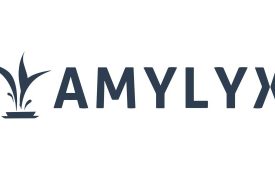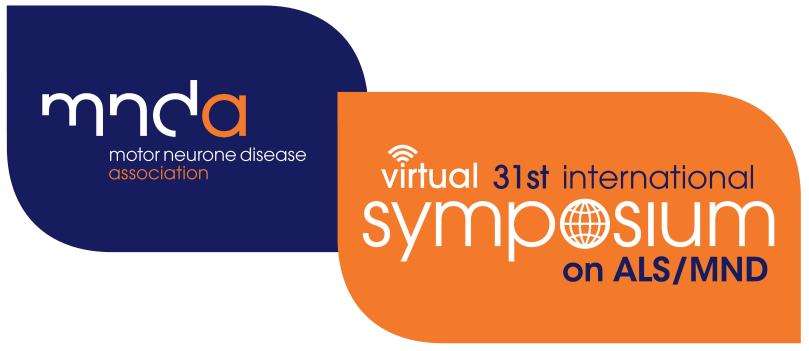
Last week the 31st International Symposium on ALS/MND was held online. This is the largest medical and scientific conference for ALS/MND experts and takes place every year. Below we provide a brief summary of our highlights for this year.
Wednesday – day 1
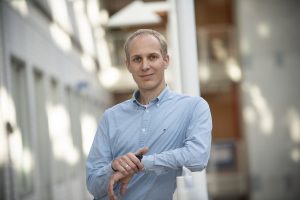
Dr Ruben van Eijk receives Paulo Gontijo award
The conference was opened by the inaugural Stephen Hawking Memorial Lecture, which was presented by Dr. Rudolph Tanzi (MGH and Harvard Medical School, USA). During his talk he discussed targeting neuroinflammation in neurodegenerative disorders. This was followed by the presentation of two awards. The Forbes-Norris Award was awarded to Professor Ammar Al-Chalabi (King’s College, UK) this year. The award is given annually to a neurologist who has shown exceptional care and compassion in the study and management of MND/ALS. Dr Ruben van Eijk (UMC Utrecht, the Netherlands) received the Paulo Gontijo award this year. This prize is awarded to the best ALS researcher under the age of 35. It encourages and recognises outstanding research performed by young investigators.
Results of several phase 3 clinical trials were discussed on the first day of the conference. Dr Merit Cudkowicz (Healey & AMG Center for ALS at MGH, USA) presented the results from the REFALS trial, which explored the clinical effects of oral levosimendan in people with ALS. Unfortunately, it appeared that levosimendan does not improve respiratory function or daily functioning as measured by the ALSFRS-R questionnaire. Next, Dr Merit Cudkowicz and Dr Ralph Kern (BrainStorm Cell Therapeutics, Israel) discussed the latest results of the phase 3 trial of NurOwn. This investigational therapy uses a person’s own stem cells to promote nerve cell repair and survival. The results, however, showed that the NurOwn treatment did not slow down the disease course in fast-progressing patients.
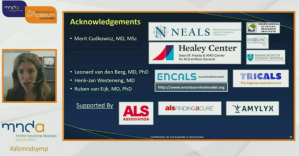
Dr Sabrina Paganoni gives update on CENTAUR results and shows the importance of global collaborations
Finally, promising results of the CENTAUR and Open Label Extension trial were presented by Dr Sabrina Paganoni (Healey Center for ALS at MGH and Harvard Medical School, USA). This trial investigated the efficacy and safety of the compound AMX0035, which appears to modestly improve functional decline in people living with ALS. During the talk she also revealed new results of an analysis which was done in collaboration with TRICALS. She showed how the ENCALS prediction model can be used to compare the prognostic risk profile between study groups (patients receiving the active drug or placebo) at baseline as an alternative to comparing patient characteristics separately.
Thursday – day 2
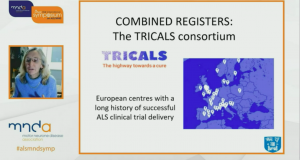
Prof Hardiman talks about the valuable insights gained from ALS registries
Professor Orla Hardiman (Trinity College Dublin, Ireland) kicked off the second day of the conference with an excellent talk about patient registries. Registries give us valuable insights into the natural history, epidemiology, genetics and environment contributing to the development of ALS. This information is vital for effective drug development. Professor Carolyn Young (The Walton Centre NHS Foundation Trust, UK) next discussed patient-reported outcomes. These provide insight in quality of life or pain, endpoints that cannot be easily captured by laboratory tests. Patient-reported outcomes are vital to unravel the effect of new therapeutic strategies. The session was concluded by Dr Fernando Vieira (ALS Therapy Development Institute, USA) with a presentation about evaluating ALS disease progression using data obtained from accelerometers and voice recordings. Remote digital technology is considered the future for ALS clinical trials, having the potential to significantly reduce the burden for patients and improve our ability to detect treatment effects.
The last session of the day was about therapeutic strategies in ALS. Professor Adriano Chiò (University of Torino, Italy) discussed current trials using antisense oligonucleotides (ASO). ASOs bind to mRNA and thereby influence protein expression. ASOs have shown to result in large clinical improvements in other rare neurological disorders such as spinal muscular atrophy (SMA) in children. The ASOs for ALS are promising and may become effective treatment options for patients with a known genetic mutation. The final speakers of the session, Dr Lorne Zinman (University of Toronto and Sunnybrook Research Institute, Canada) and Dr Agessandro Abrahao (University of Toronto, Canada), presented a fascinating new technology of focussed ultrasound to non-invasively and temporarily open the blood-brain-barrier. This way, drugs can be delivered at the place where they are needed the most. This can prevent invasive alternatives such as intrathecal and intraspinal injections.
Friday – day 3
On Friday, the first session of the day was dedicated to COVID-19 and how this affected patients, caregivers and researchers. COVID-19 had many negative consequences, but also brought many opportunities and innovative solutions. For example, by introducing and applying measures at home the continuation of clinical trials could be ensured. Other inventive ways were established for patients to stay connected to their families and caregivers, as well as for investigators to continue their research.
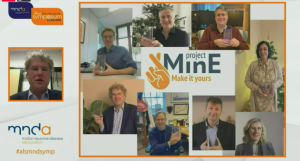
Project MinE wins Healey Center Award
In addition, the Healey Center international prize for innovation in ALS was granted to Project MinE. Project MinE was started in 2014 by three Dutch ALS patients and is now the largest single disease whole genome sequencing project in the world. The initiative has contributed significantly in the discovery of several ALS genes and generates its success through the international collaboration between patients, clinician-scientists, and patient organizations from 19 countries. Project MinE is characterized by the unique collaboration between countries that share a custom-made ICT solution in order to be able to process large scale genomics data.
Lastly, the wonderfully organised online MNDA symposium ended with an excellent talk by Professor Matthew Kiernan (University of Sydney, Australia) on new diagnostic criteria which were generated in 2019 during the MNDA meeting in Australia. These new criteria can reduce diagnostic delays and increase the number of patients that are eligible for trials.
Related news
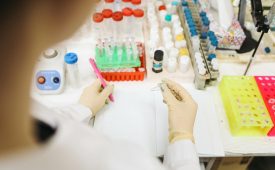
European Commission approves Tofersen as treatment for ALS-SOD1
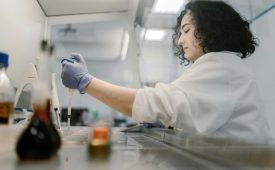
Amylyx terminates open-label extension of the PHOENIX study
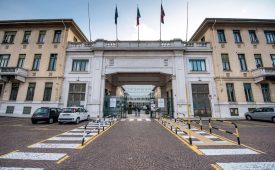
Meet the centre - Torino ALS Center (University of Torino)
